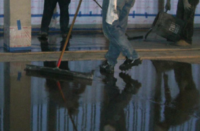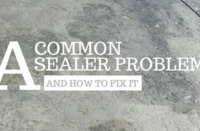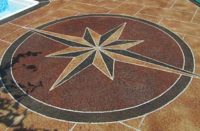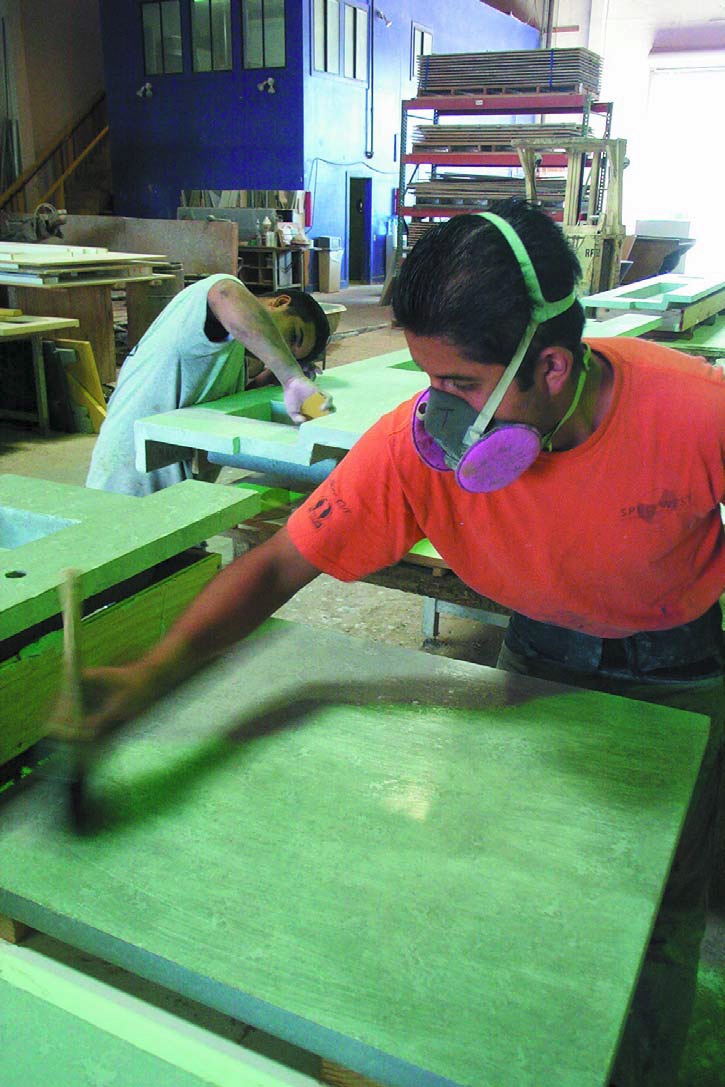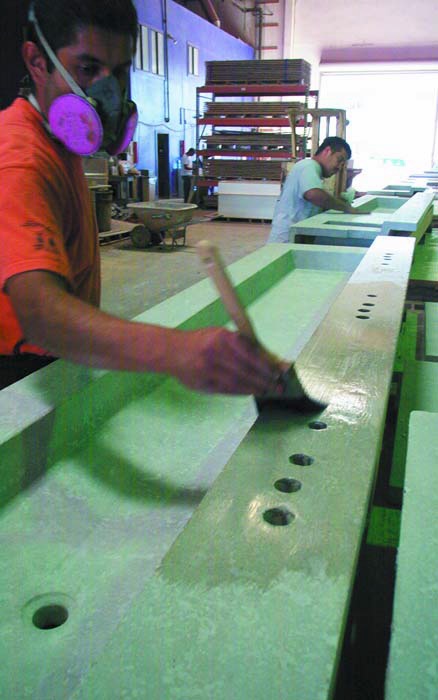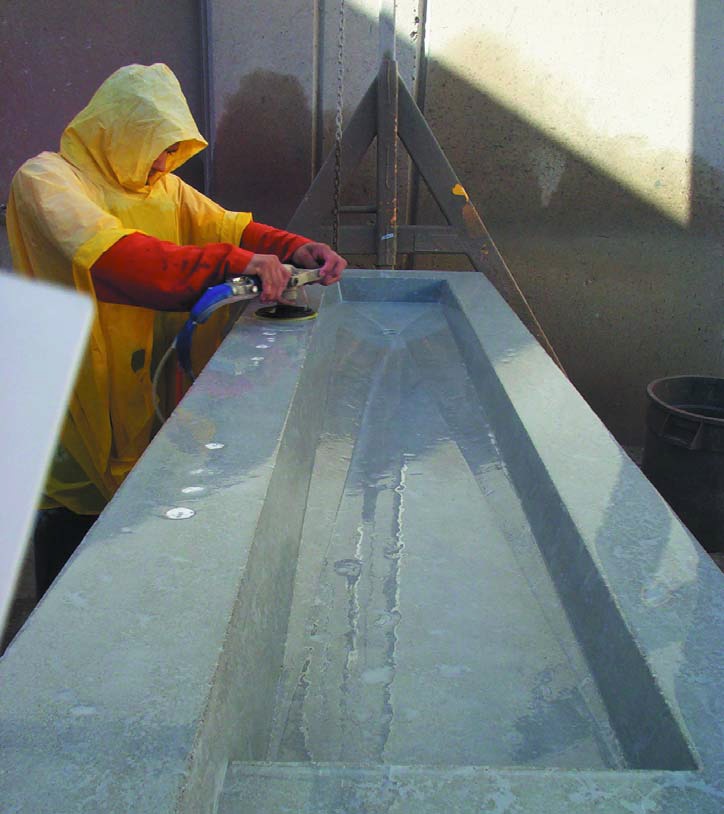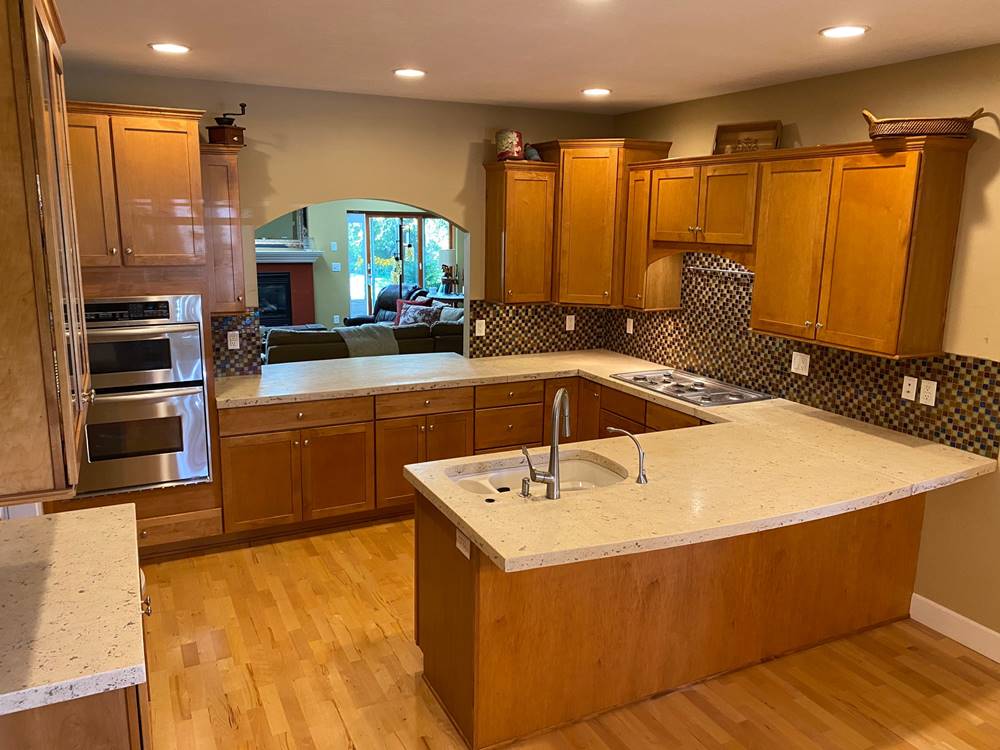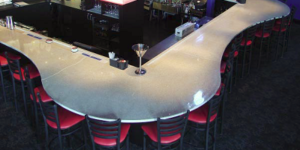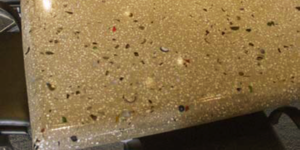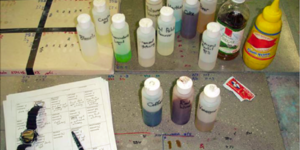Concrete countertops need protection from everyday abuses. The acids in vinegar and lemon juice can etch the surface, and the strong colors in tea, red wine and mustard can cause stains. While sealers are not a total guarantee, they can go a long way in ensuring a concrete countertop retains its “like new” appearance for a good long while. Here are some tips to help you choose the right concrete countertop sealers.
A wide range of materials can be used to seal concrete countertops. Each has its own performance characteristics and maintenance requirements. Methods of application may be an important consideration. In the kitchen, a prime issue is whether a sealer is food-safe.
If you are new at creating concrete countertops, it is wise to consult with an experienced countertop contractor to learn which sealers work best for specific countertop applications. Often, you can also acquire appropriate knowledge when you take in-depth concrete countertop training. For the sake of our brief discussion, the experts at the Concrete Countertop Institute divide concrete countertop sealers into two main categories: penetrating sealers and film-building sealers. The following is an overview:
Penetrating sealers
Penetrating sealers soak into the concrete surface and dry to a nearly invisible appearance. Liquid hardeners work by decreasing the porosity of the concrete. Repellants, such as silanes, siloxanes and fluorocarbons, work by increasing the surface tension to cause beading. There are also formulations that are a combination of both.
Concrete countertops sealed with penetrating sealers offer some degree of protection, but it is still important to quickly wipe up water, acidic liquids, and substances that could stain the surface.
Film-building sealers
Wax is the most basic film-building sealer. There are a variety of waxes that can be used, including plain beeswax; however, automotive waxes should be avoided because of additives in those formulas. Wax produces a low- to moderate-sheen finish. It is easy to apply and, usually needs to be reapplied regularly to remain effective. By itself, it offers minimal protection. And, because it is wax, warm temperatures can cause it to melt and acids can strip it away.
Acrylics are a commonly used sealer. They come in solvent-based or water-based formulations (solvent-based products are often preferred). These sealers dry water-clear and are UV-resistant. Acrylic sealers can be brushed, sprayed or rolled on to the concrete. Water-based products are less durable than solvent-based, but, overall, they offer moderate protection and some heat resistance. Acrylic sealers can scratch, so periodic reapplications are required for upkeep.
Epoxies come in hundreds of different formulations, but two-component systems are typically used for concrete. They offer a durable, hard surface that is very resistant to staining, but they can be affected by UV light if a UV inhibitor is not part of the formula. Epoxies create a very shiny surface and are subject to scratching. They are also sensitive to heat.
As a rule, urethanes are very stain-resistant and heat-resistant, provide good UV resistance, and are scratch-resistant. They can produce a matte or glossy finish, but also can look “plasticky” due to thick film buildup. Be aware that the application of urethanes can be tricky and that they require strict substrate preparation. Urethanes also are very expensive.
Tips from the experts
Steve Eylor, Eycon
“Topical sealers are pretty much bulletproof when it comes to acid and stain resistance, but you lose aesthetics. You get that glossy, plastic look and feel. It scratches and is harder to repair. I use penetrating sealers mainly because they let the concrete breathe. This helps in the aging process to let the concrete naturally patina. Penetrating sealers are stain-resistant, not stain-proof. The sealer I use has a 15-year warranty on it. [How much use the counter gets] determines reapplication need.”
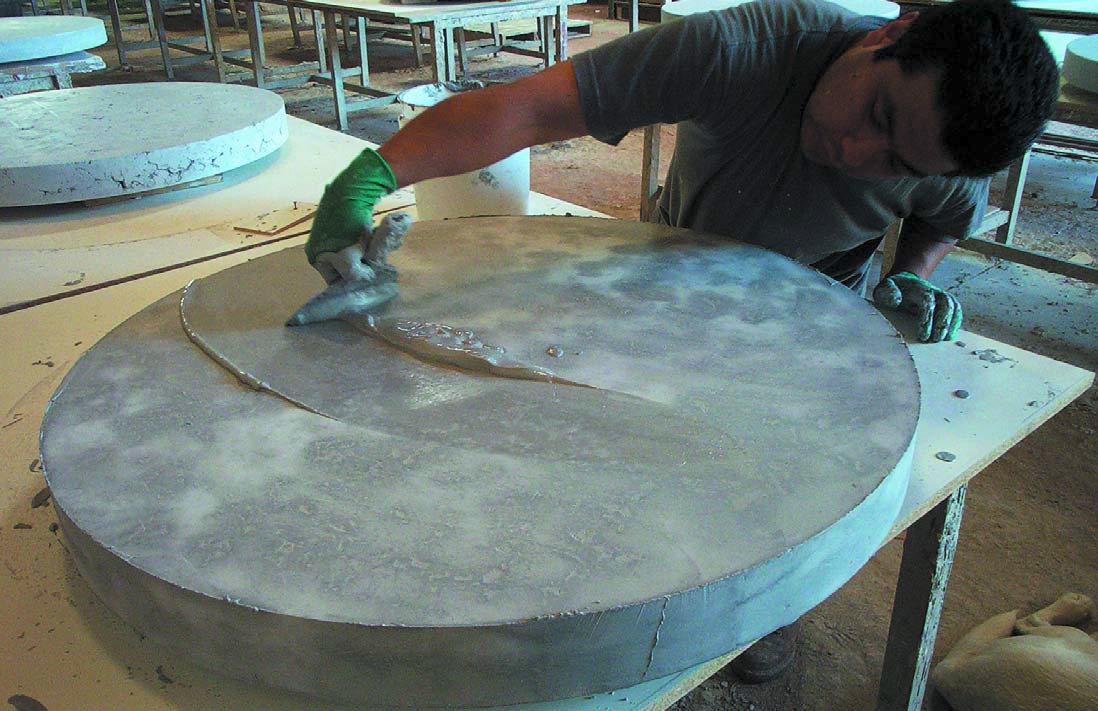 Fu-Tung Cheng, Cheng Design
Fu-Tung Cheng, Cheng Design
“[The] Holy Grail of concrete sealers — by definition one that protects the concrete from staining without encasing it in a layer of vulnerable plastic — has yet to be invented or discovered.
“Most penetrating sealers do a reasonable job resisting water penetration, but it’s a different story with acids such as vinegar, wines, lemon juice and salad dressings. At best, they resist those substances for a few minutes, just enough time to wipe them up.
“Most homeowners do not like the high-gloss, topical finishes like urethane or epoxy. The look is too plastic and the tactical appeal of the concrete is lost. Many fabricators who use topical sealers (because they are virtually stain-proof) dull the gloss with steel wool to a satin finish and then wax and buff to get a more natural look. We are now using a hybrid topical sealer that penetrates and leaves a thin film of protection that gets waxed over. It’s the best we have found, but hardly perfect.”
Buddy Rhodes, Buddy Rhodes Studio
“Most people do not like a highly polished surface, but more of a natural look. We use a combination of products. We first brush on one to two coats of penetrating sealer that absorbs into the surface. Then we apply a topical sealer, either lacquer or water-base, to bring out the colors in the slabs and to put a layer of sealer between the stain and the cement. Last, we put on a wax and buff it out.
“[In the kitchen], we use food-grade beeswax for the last coat. The wax is used on a regular maintenance schedule, say once a month or so, to protect the surface from stains. But with all that, the cement will acquire a patina over time.
“We try not to tint the sealer because it may wear down [unevenly] over time and leave you with an untinted area.”
Daniel Gobillot, Stone Soup Concrete
“What we’re using now is an FDA-approved product that contains ethylene glycol, butyl carbitol and dibutil phthalate. It works as a permeating and topical sealer, applied over about five days in five to 10 coats. We stay away from epoxies and lacquers because they don’t work with the concrete. I use butcher’s wax [for the kitchen] in my own home.”
Questions from Readers
Question
I’ve had white concrete and crushed glass counters for 3 years. The sealer my installer used left a nice satin smooth finish (not plasticky) that he claimed needed no maintenance for 30 years. It scratched right away (after 2 weeks of curing) and things like spinach and lime caused staining, even if wiped immediately. Fats around the stove also caused graying and high-use areas became rough and porous.
We used diamond pads (up to 240) and tried to fill the pores with grout. They still feel very rough in high-use areas (where we ground the most to remove stains). I applied Tuff Duck grout and marble sealer which claims to penetrate, leave a sheen and repel liquids, but it appears to have done nothing. It didn’t soak in and they look exactly the same.
What sealer would you recommend for a high-use kitchen? Can I use it on top of the Tuff Duck? Do I need to sand the rough spots more? How important is it that the pin holes are all filled?
Answer from Concrete Decor publisher, Bent Mikkelsen
Thanks for your inquiry.
It so happens that in addition to talking about concrete countertop sealers for 20 years in the pages of Concrete Decor magazine, I have concrete countertops in my house. I have resealed them three of four times in the last 17 years. They still look great but each time I reseal, I strip the countertops down to the concrete to make sure I have an absolutely clean substrate for the new coating.
The last time we sealed the countertops I did the same stripping of the surfaces (about a two-hour process) but instead of another countertop sealer I chose a product I have been hearing good things about. I was fortunate enough to have the owner of Ultra Durable Technology out to help me apply the product. It was certainly a job I could have accomplished on my own, but his insight was helpful.
What I was a little surprised by was how thin the material application was applied. Regardless, both my wife and I are very happy with the finish. It cleans nicely and doesn’t stain. The matte finish included aluminum oxide powder so there’s a bit of a gritty feel to the counter that we haven’t had before, but we still love the outcome. We selected the additive as an added protection from scratches. Aluminum oxide is also used for slip resistance with floor coatings. I will add that the product has virtually no odor.
I don’t know if I will get 30 years out of any sealer but I’m very happy with the results that this product delivered.
Question
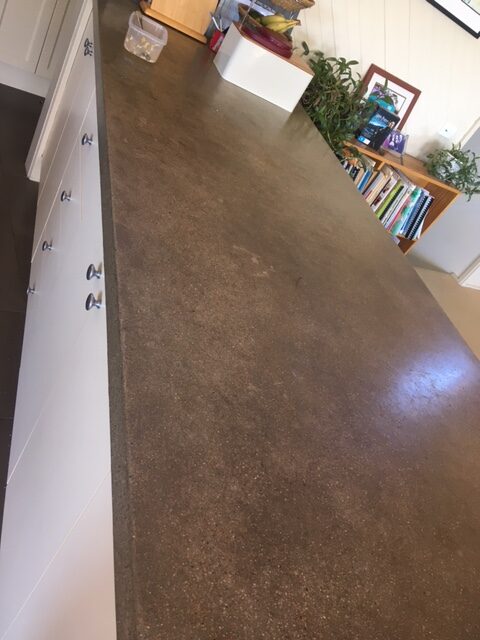
I have a concrete bench in my kitchen that needs resealing. Does it matter that I don’t know what was previously used too seal it? What do you recommend?
Answer from Concrete Decor
It’s generally a good idea to sand the existing surface with a palm sander using first an 80 grit and then 120 grit sandpaper. This process can be a little dusty but it does give your new sealer something to grab hold of.
If the existing sealer is flaking and delaminating from the concrete surface, you can also strip the old finish. But once again, even after stripping you need to wash the surface to remove any remaining stripper. Then sand the surface as mentioned already.
We offer a sealer that does an excellent job and will withstand years of abuse. It’s called Impact and it is actually made for coating terrazzo floors in restaurants, malls and airports. Its delivers a beautiful gloss or matte finish (I actually have it on my concrete kitchen counters). Very easy to work with as well.
